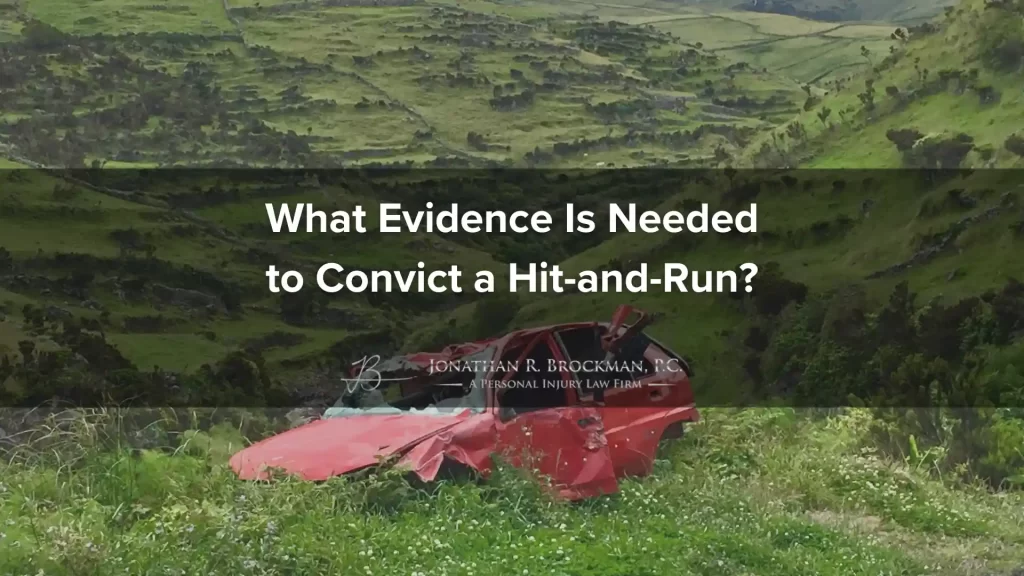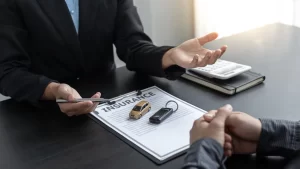Posted on Tuesday, May 23rd, 2023 at 12:00 pm
 In a hit-and-run situation, you might feel like you’re left picking up the pieces alone. But know this: you’re not alone, and there is a way forward. Our Georgia hit-and-run lawyers’ goal with this blog post is to guide you through the aftermath of these unfortunate incidents. Specifically, we will delve into the intricacies of the evidence needed to convict in a hit-and-run case in Georgia. Because even though the culprit might have disappeared from the scene, they cannot easily escape the long arm of the law. Read on to learn more.
In a hit-and-run situation, you might feel like you’re left picking up the pieces alone. But know this: you’re not alone, and there is a way forward. Our Georgia hit-and-run lawyers’ goal with this blog post is to guide you through the aftermath of these unfortunate incidents. Specifically, we will delve into the intricacies of the evidence needed to convict in a hit-and-run case in Georgia. Because even though the culprit might have disappeared from the scene, they cannot easily escape the long arm of the law. Read on to learn more.
Georgia Hit-and-Run Laws
Georgia lawmakers and law enforcement do not take hit-and-run incidents lightly. Under the law, it is mandatory for any driver involved in an accident to stop and assess the situation. Several key statutes address this.
Firstly, Georgia law states that drivers involved in an accident resulting in injury, death, or property damage must immediately stop at or as close to the scene as possible. They are then required to return to the scene of the accident and do the following:
- Provide their name, address, and vehicle registration number.
- Upon request, show their driver’s license.
- Offer assistance to any injured person, including arranging for medical aid if it is apparent that such treatment is necessary.
Failure to fulfill these duties is a misdemeanor offense. However, if the accident led to someone’s serious injury or death, the offense escalates to a felony. Moreover, another Georgia statute says drivers must report an accident to the local police department if there’s an injury, death, or property damage above $500.
These laws help protect all road users, ensuring accountability, aid for victims, and swift justice when drivers shirk those responsibilities. These statutes are the cornerstone for building a hit-and-run case, serving as the foundation for collecting the evidence needed to establish the offender’s culpability and get a conviction in your hit-and-run case.
Read more: What to do in a Hit-and-Run Accident
How Do Georgia Police Handle Hit-and-Run Investigations?
When someone reports a hit-and-run in Georgia, the police are crucial in gathering the necessary evidence to identify the perpetrator and hold them accountable for their actions. Here’s a general overview of how the police proceed with a hit-and-run investigation in Georgia:
- Scene Examination: Police will survey the accident scene, searching for any physical evidence left behind. This could include parts of the offending vehicle, paint scrapes, skid marks, or broken glass. Each item can help determine the vehicle’s make and model or reveal additional details about the incident.
- Witness Statements: If there were any witnesses to the incident, police would interview them to gather their accounts. Eyewitness testimony can provide additional details about the offending vehicle, the driver, or the circumstances of the incident.
- Surveillance Footage: The police will also look for cameras that might have captured the accident. This could be security cameras from nearby businesses, homes, or even traffic cameras.
- Vehicle Search: If someone recorded the offending vehicle’s license plate number, or if there’s enough information about the make and model of the car that fled, police can use this information to track down the vehicle and its registered owner.
- Forensic Investigation: In some instances, forensic scientists might analyze the physical evidence left behind, such as paint chips, which can be matched to a specific vehicle type or even a specific vehicle.
Common Types of Evidence in Hit-and-Run Cases
Some common evidence Georgia police use in hit-and-run investigations includes:
- Your statement about the crash
- Witness statements
- Security or traffic camera footage
- Physical evidence from the scene (skid marks, paint chips, broken parts, etc.)
- Photographs of the damage and accident scene
- Medical records, if anyone sustained any injuries
- Vehicle damage reports
- Expert testimony (accident reconstruction, forensic analysis)
- Cellphone records, if police suspect a distracted driver
- Traffic violation records of the suspected vehicle/driver
- GPS data, if available
Compensation for a Georgia Hit-and-Run Crash
 Recovering compensation for a hit-and-run accident in Georgia typically involves one of two routes. If the police can locate the driver who caused the hit-and-run, you can file a claim against that driver’s auto insurance policy for compensation. But if the police can’t find the driver who fled, you could still recover compensation through your own auto insurance policy if you have Uninsured Motorist (UM) coverage. UM coverage protects you when you’re involved in an accident with a driver who has no insurance or cannot be identified, such as in a hit-and-run scenario.
Recovering compensation for a hit-and-run accident in Georgia typically involves one of two routes. If the police can locate the driver who caused the hit-and-run, you can file a claim against that driver’s auto insurance policy for compensation. But if the police can’t find the driver who fled, you could still recover compensation through your own auto insurance policy if you have Uninsured Motorist (UM) coverage. UM coverage protects you when you’re involved in an accident with a driver who has no insurance or cannot be identified, such as in a hit-and-run scenario.
Remember, each insurance policy and situation is unique, so discussing your case with a Georgia hit-and-run accident attorney is vital to determining the best path for recovering compensation.
Call Jonathan R. Brockman, P.C. at (770) 205-8827 today or complete our contact form for a complimentary case evaluation.
Related pages:
